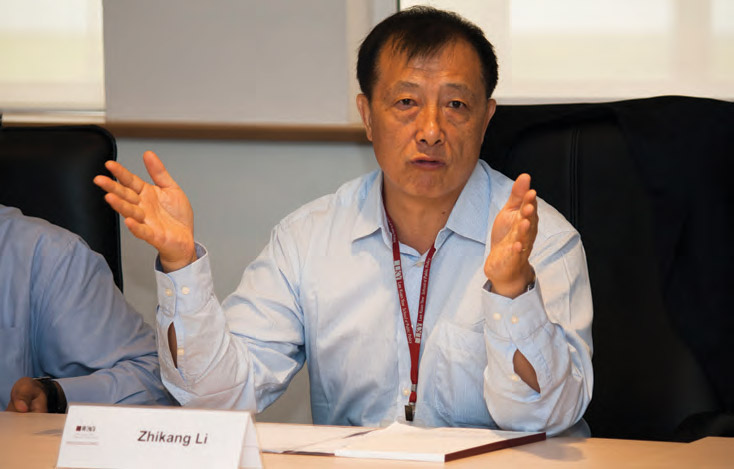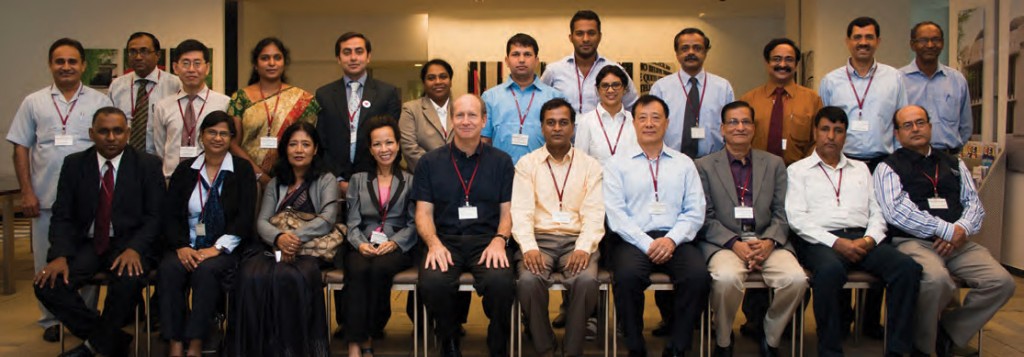
The Sloan Project on South Asian Science Engagement “Scientists Across Borders” seeks to bridge the gap between scientists working on critical policy issues in South Asia. Image: LKYSPP
The Green Revolution, initiated during the 1960s, helped the underdeveloped and developing countries of the world overcome widespread hunger and poverty. Fifty years ago, around a billion people, or roughly half of the population, in the developing world starved or didn’t have enough food to eat. While the number of people who remain hungry hasn’t changed much, the Green Revolution has helped reduce the proportion of hungry people across the global south. Many social, political, and institutional factors contributed to this change; however, the principal contribution has been the use of science and technology to achieve higher crop yields of common staples such as wheat, rice, and maize.

Image: LKYSPP
To further explore how scientists across South Asia are addressing issues surrounding rice production across the region, the LKY School organized the inaugural conference on South Asian Science Engagement on 18th and 19th October 2012. The purpose of the conference was to create a platform for exchange of scientific knowledge and facilitate scientists from South Asian countries to contribute to discourses related to science, growth, development, and sustainability. The conference was funded by the Alfred P. Sloan Foundation, New York.
The inaugural conference focused on how scientists across South Asia are addressing current and future problems pivoted around enhancing regional rice yields. Presentations at the conference included contributions from scientists working at this particular intersection on areas such as varietal development, nitrogen management and efficiency, effects of photosynthesis on rice, water and irrigation technologies, and crop management innovations were presented at the conference. The dialogue provided space for candid discussions and knowledge sharing between regional scientists on issues related to the core problem of enhancing rice yields and addressing future challenges for Asia’s most common staple crop. Fifteen scientists from six South Asian countries (Bangladesh, Bhutan, India, Nepal, Pakistan, and Sri Lanka) and China attended the conference.
Fifteen scientists from six South Asian countries and China attended the conference.The dialogue provided space for candid discussions and knowledge sharing between regional scientists on issues related to the core problem of enhancing rice yields and addressing future challenges for Asia’s most common staple crop.
Several insights emerged on the state of rice production across South Asia and how scientists are attempting to increase yields whilst simultaneously facing multiple constraints. Resource deficits are pervasive across South Asia. Major inputs for rice cultivation—land, water, fertilizer, capital, labour, and climate patterns—are under duress. Acreage is diminishing across the region with land and water resources facing competing demands due to urbanisation and industrialisation. Labour shortages are intensifying due to rising urban migration. Climate change has disrupted the context of cultivation, dramatically affecting seasonal weather patterns and altering ecological conditions. The demand for rice is expected to grow faster than production in most countries.
Whether the current level of annual production of 524 million tonnes could be increased to 700 million tonnes by the year 2025 using less land, less water, less manpower, and fewer agrochemicals is the big question. (More information can be found in Papademetriou, M.K. Rice Production in the Asia Pacific: Issues and Perspectives. Food an Agriculture Organization (FAO) Accessible at: http://www.fao.org/docrep/003/x6905e/ x6905e04.htm). Thus, current agricultural production will not only have to be sustained, it will have to commensurately rise alongside diminishing land, water, fertilizer, and labour whilst facing climate uncertainties.
Resource deficits are pervasive across South Asia. Major inputs for rice cultivation—land, water, fertilizer, capital, labour, and climate patterns—are under duress. (…) Whether the current level of annual production of 524 million tonnes could be increased to 700 million tonnes by the year 2025 using less land, less water, less manpower, and fewer agrochemicals is the big question.
 Image: LKYSPP
Image: LKYSPPTo meet this challenge, scientists are leveraging technology. To develop new rice varieties, scientists are deploying molecular breeding, genome sequencing, data and bio-technological tools. Several innovative crop management technologies and practices are being used, such as geographic information system (GIS) and remote-sensing technologies to map, monitor, and assess potential and total crop yields. Precision agriculture is being introduced to remedy low crop productivity due to inept water and soil management practices. Scientists are also harnessing geo-informatic technologies to efficiently manage water resources. Spatial analysis is being vigorously used to enhance crop productivity. To better confront climate change, scientists are engaged in transforming the genetic pathways in rice by making them more carbon friendly and efficient. Rice intensification systems are being developed to absorb and thwart anticipated water loss. Cutting-edge seed producing technologies that measure seed’s genetic purity are also being utilised to mitigate seed loss.
Following panel sessions that explored rice production from a multi-disciplinary perch, scientists convened to articulate their thoughts on regional science engagement and how to sustain it, possibly through a joint project that unites mutual interests and objectives. Several scientists called for the establishment of a regional knowledge portal on rice that will act as a knowledge hub for their scientific peers and farmers. There were also calls for more emphasis on precision agriculture given the onset of the digital revolution and the accessibility of such applications for agricultural purposes.
An in-depth understanding of climate change and its effects on food is sorely needed; and so is robust policy analysis that underscores problems farmers face across the region vis-à-vis rice cultivation. More broadly, scientists urged for the strengthening science-innovation policy linkages given the complex nature of challenges in food production that calls for sustained collaboration between scientists, policymakers, and farmers.

Karthik Nachiappan is a research associate at the Centre on Asia and Globalisation (CAG) at the LKY School, where he researches Asia’s evolving role with global governance. His email
is karthiknach@nus.edu.sg